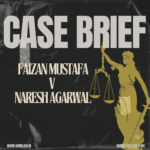
IN THE HONORABLE SUPREME COURT OF INDIA
IN THE MATTER OF
CIVIL ORIGINAL JURISDICTION
Writ Petition (Civil) No.528 of 2018
INTERNET AND MOBILE ASSOCIATION OF INDIA …. Petitioner
Versus
RESERVE BANK OF INDIA ….. Respondent
Case Brief of Internet and Mobile Association of India Versus Reserve Bank of India
BACKGROUND
In the year 2018, a European Parliament and Council Directive defined virtual currency as digital representation of value recognized by no central bank or public authority, is not necessarily pegged to a legally established currency but it is accepted by natural or legal persons as means of payment, can be transferred, stored and traded electronically.
Reserve Bank of India (RBI) is responsible for maintaining monetary stability in India and was nationalized on July 1st 1949.
In June 2013 RBI learnt from Financial Action Task Forces’ report- an intergovernmental organization created at G7 initiative that virtual currencies were growing due to massive utilization mobile technology online.
On December 24th, a press release from RBI clarified that creation, trading and usage of Virtual Currencies as a medium of exchange are not authorized by the Central Bank or any other monetary authority.
Enforcement directorate raids in Ahemdabad at two companies named bitcoin and buysellbitco.in on 27th December 2013. Subsequently in 2014 & 2015 there were reports issued by FATF concerning trading risks entailed with Virtual Currencies
STATEMENT OF FACTS
The Reserve Bank of India had circulated “statement policies on institution Developmental and Regulatory policies” dated April 6th In exercising the powers conferred upon it under section “35A read with Section36 (1) (a)” & Section “56 of Banking Regulation Act.1949,” further under Sections “45JA” & “45L” Of RBI Act”.
Paragraph thirteen prohibited banks including entities regulated under this regulation from engaging in transactions involving virtual currencies or approaching such people’s relationships if they have already obtained any services related to virtual currencies.
In this regard, the circular was premised on the fact that due to hacking; virtual currencies could be objects for speculation given their lack of underlying assets thereby leading to significant losses. It was noted that use of virtual could facilitate money laundering and terrorist financing.
As an effect of the ban, the exchanges through which trading in virtual currencies was being conducted will be unable to maintain and operate bank accounts thereby putting an end to their business
It must be noted that at the time circular was issued there was no specific legal prohibition on use or trade of cryptocurrencies in India and by RBI’s ban, cryptocurrencies were ghettoized from mainstream economy.
RBI has also directed banks not to maintain accounts or give loans against Virtual currencies. Furthermore, collateral acceptance of virtual currency and sale/transferring on purchase/ transfer of virtual currency were forbidden
Internet and Mobile Association of India moved Supreme Court challenging RBI circular stating that it directs respondents not to restrict banks as well as other financial institutions from giving access to banking services including transactions associated with virtual currencies.
STATUTES AND PROVISIONS REFERRED
BANKING REGULATION ACT, 1949
SECTION 35A. Power of the Reserve Bank to give directions
(1) If the Reserve Bank is satisfied that-
(b) In order to prevent the affairs of any banking company from being carried out in a manner that is adverse to depositors’ interests or against the interest of the company;
(c) it has become necessary to give directions generally to banking companies or any particular banking company for proper management, and it may issue such directions as it deems fit from time to time, and every bank or banks upon whom such directions are applicable shall be bound by these directions.
(2) The Reserve Bank may modify or cancel any direction issued under sub-section (1), either on representation made to it or on its own motion, and while modifying or canceling any direction may impose conditions as it thinks fit subject to which the modification or cancellation shall have effect.
SECTION 36. Additional powers and functions of Reserve Banks
(1) The Reserve Bank may-
(a) caution banking companies generally against entering into any particular transaction or class of transactions including issuing advice to individual banks.
SECTION 56. Modifications in respect of co-operative societies
The provisions of this Act for the time being in force shall apply to, or in relation to co-operative societies as they apply to, or in relation to banking companies with the following modifications, namely:– (a) Throughout this Act, unless otherwise required by the context,— (i) references “to a “banking company” ot “the company” ot “such company” shall mean references ’o a co-operative bank; (ii) references ‘ten days from [commencement]’ shall mean references ’o ten days from ’he commencement of he Banking Laws (Application lo Co-operatwe Societies Act, 1965..’
RESERVE BANK OF INDIA ACT, 1934
SECTION 45JA. Power of Bank t determine policy ad issue directions.
(1) If the Bank is satisfied that doing so would be in public interest; for regulating financial system in country’s favour; to prevent non-banking financial companies from compromising the interest of their depositors or compromising themselves, it may accordingly determine its policy and issue directions to all or any of the non- banking financial companies in relation to income recognition, accounting standards, making of proper provision for bad and doubtful debts, capital adequacy based on risk weights for assets and credit conversion factors for off balance sheet items as may be deployed by a non-banking financial company/ class of non-banking financial companies/non-banking financial companies generally in relation to deployment of funds; which shall be followed by such non-banking.
(2) Without prejudice to the generality of the powers vested under subsection (1), the bank may give directions to nbfcs generally or a class of nbfcs or any nbfcs in particular as to–,
(a) The purpose for which advances may not be made or other fund-based/non-fund-based accommodation may not be given.
(b) the maximum amount of advances or other financial accommodation or investment in shares and other securities which, in consideration of the paid-up capital, reserves, and deposits of the non-banking financial company plus other relevant matters has to be taken into account can be made by that non-banking financial company to any person or a company or to a group of companies.
SECTION 45L. Power of Bank to call for information from financial institutions and to give directions.
(1) If it is necessary for enabling the bank regulate credit system in favor of its own country the Bank may require them– (a) either generally or specific groups or individual financial institutions shall provide the Central Bank with such statements as are specified by it from time to time by general order after they furnish information about their business operations within stipulated period. (b) Such directives directed at them.
(2) The statement, information or particulars which every financial institution is required to supply under clause (a) of sub-section (1), amongst others, could relate to following: paid-up capital, reserves and/or liabilities; investments whether in Government securities or otherwise; persons who finance them for a particular purpose over a certain period and on specific terms including interest rates etc….
(3) In giving directions to any financial institution under clause (b) of sub-section (1), due regard shall be had by the bank for the nature and extent of its establishment purposes, if any statutory responsibilities, and impact upon money as well as capital market trends exerted through activities undertaken by these institutions.
ISSUES RAISED
Whether this prohibition violates Article 19(1)(g) regarding freedom to trade guaranteed under Indian Constitution i.e., Fundamental Right Whether it is based on public interest?
Should RBI get the authority over cryptocurrency?
Was this an issue that legislative action should determine rather than what was done through executive decision?
SUBMISSION ON BEHALF OF THE PARTIES BEFORE THE HON’BLE SUPREME COURT OF INDIA
PETITIONER’S CONTENTIONS
The petitioner argued that RBI does not have the jurisdiction to ban trading of virtual currency as they are not a legal tender (a form of money that court of law are required to recognize as satisfactory payment for monetary debt under section 24A 8 RBI Act) but rather means of exchange or stores of value.
Also, it was contended that the ban imposed by RBI is violated the fundamental Right to trade and it is against the test of Reasonability and proportionality.
RESPONDENT’S CONTENTIONS
The first argument was responded to by the respondent, who pointed out that virtual Currencies are digital payment forms with a medium of exchange and store of value, thus giving RBI power to regulate and prohibit such transactions. It was further explained that since virtual currencies operate on their own, they cannot be influenced by the government.
In addressing the second contention, RBI countered that cryptocurrency is actually a stainless steel digital currency wherein trading is achieved using cryptographic methods. The Indian Constitution guarantees the fundamental right to freedom of trade but it is not an absolute one; it therefore has some reasonable restrictions. The circular banned cryptocurrency trading in order to protect public interest and minimize fraud as well as illegal acts.
DECISION OF THE APEX COURT
The Court pronounced that the RBI Notification which directed local financial institutions to cease banking services for anyone or any business dealing in crypto-assets had to be quashed on “the ground of proportionality”.
The Supreme Court simply reversed RBI’s prohibition and observed as follows:
RBI “could not find any published data or study conducted by them” regarding their standpoints in relation to Virtual Currencies.
“The consistent stand taken by RBI up to and including in their reply dated 04-09-2019 is that RBI has not banned Virtual Currencies in the country” together with
Even the Inter-Ministerial Committee appointed on 02-11-2017 initially recommended a particular regulatory framework including enactment of a new law specifically, Crypto-token Regulation Bill 2018; however, its opinion was that banning might be an extreme tool whereas similar goals might be achieved through regulatory measures.
The Court also noted that VCs ‘fall within many categories such as property/asset’, commodity, derivative/non-traditional currency, payment instrument and money’ but qualified this finding by saying it did not fully reflect the position of law. Although it declined equating VCs with legal tender or fiat money, the court would not accede to the contention that VCs can never be considered real money. The Court concluded that where something may not be good as money but could nevertheless function as such in some cases, the RBI retained the capacity to address the clash between its role as apex regulator of the country’s monetary system.
JUDGMENT
The Circular was disproportionate because none of the regulated entities by RBI suffered any loss or adverse effect directly or indirectly on account of having any business relationships with VC exchanges. Moreover, relying on regulatory approaches from other jurisdictions, the Court held that there were alternative regulatory means through which RBI could have achieved its stated objectives. The import of the court’s decision in this regard was that rather than prohibition, regulation would have been a more proportionate response.
CRITICAL ANALYSIS
According to the court, the circular violated the rights granted by Article 19(1)(g) and is also an example of the doctrine of proportionately infractions. This judgment reinforces proportionality as a litmus test in resolving cases arising under Article 19 and applying it to warts and all. In Anuradha Bhasin v. Association of India (2020 SCC Online SC 25), the court invoked this principle but did not apply it to facts before it. The court does not avoid doing so here, and it should be commended for that.



